From Insights to Empowerment: Building a Next-Generation Mood Tracker App
Are you intrigued by the booming market for mood tracking apps but overwhelmed by the challenges of creating a successful product in a highly competitive landscape? We’re here to help.
Whether you’re an entrepreneur venturing into the digital health space or an investor looking to make informed decisions, our article will equip you with practical insights and proven strategies to overcome the hurdles and develop an emotion tracker app.
By drawing on our expertise and real-world experiences, we’ll guide you through the process of mood-tracking app development that resonates with your target audience and drives user engagement.
Table of contents
- Understanding the Common Triggers for Using Mood Tracking Applications
- Must-Have Features for Mood Tracking App Development
- Best Practices and Expert Insights for Developing a Cutting-Edge Mood Tracking App
- How Much Does It Really Cost to Develop a High-Quality Mood Tracking App?
- Strategies for Monetizing Your Mood Tracking App
- Alternative-spaces Experience
- Summing up
- FAQ
Understanding the Common Triggers for Using Mood Tracking Applications
Mood-tracking apps have gained significant popularity in recent years because they provide users valuable insights into their emotional well-being. The Global Mental Health Apps Market size is expected to reach $10.2 billion by 2027, rising at a market growth of 16.3% CAGR during the forecast period.
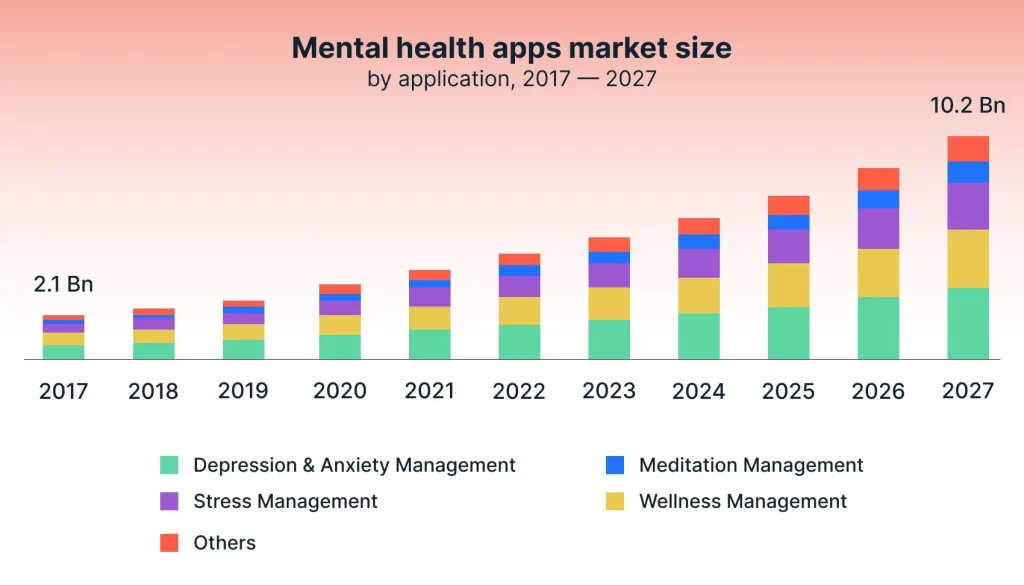
There are several reasons why the use of these apps is increasing:
Limited access to mental health services
Traditional mental health services may have limited availability or high costs, making it challenging for individuals to seek timely support. Mood-tracking apps offer a convenient and accessible alternative, allowing users to monitor their moods and emotions in real-time.
Personalized self-care
Mood-tracking apps provide personalized features and tools that cater to individual needs. Users can track their moods, set goals, and receive personalized recommendations for managing their emotional well-being. This level of customization and self-care resonates with users, contributing to the growing consumption of these apps.
Technological advancements
The advancements in smartphone technology and the widespread use of mobile devices have made mood-tracking apps easily accessible to a larger audience. With user-friendly interfaces and intuitive designs, these apps can be easily integrated into daily routines, contributing to increased consumption.
Mental health awareness
There has been a significant increase in mental health awareness, with more people recognizing the importance of caring for their emotional well-being. Mood-tracking apps align with this trend by empowering users to actively monitor and manage their moods, fostering a sense of control and self-awareness.
Must-Have Features for Mood Tracking App Development
To create an effective and user-friendly mood tracking app, it is crucial to incorporate key features that offer comprehensive functionality and a seamless user experience. Below we will explore the essential features of mood tracking app that make a solution stand out, enabling users to track, analyze, and manage their emotions with ease.
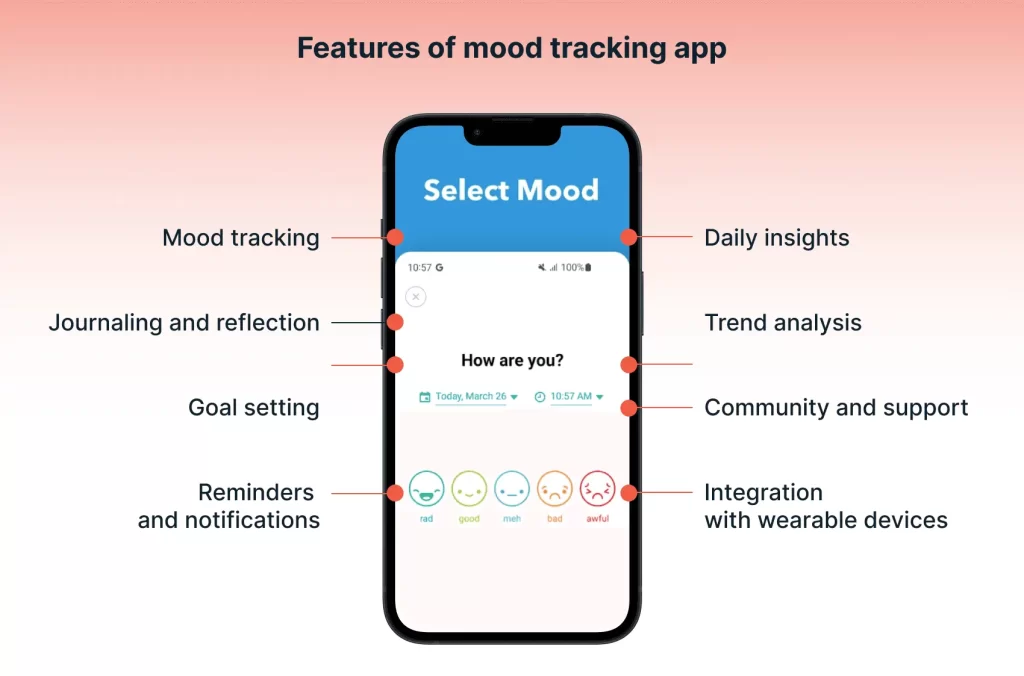
Mood tracking
Allow users to track and log their moods throughout the day, enabling them to gain insights into their emotional well-being over time. This can be done through a user-friendly interface where users can select their mood from various options, such as happy, sad, stressed, or anxious.
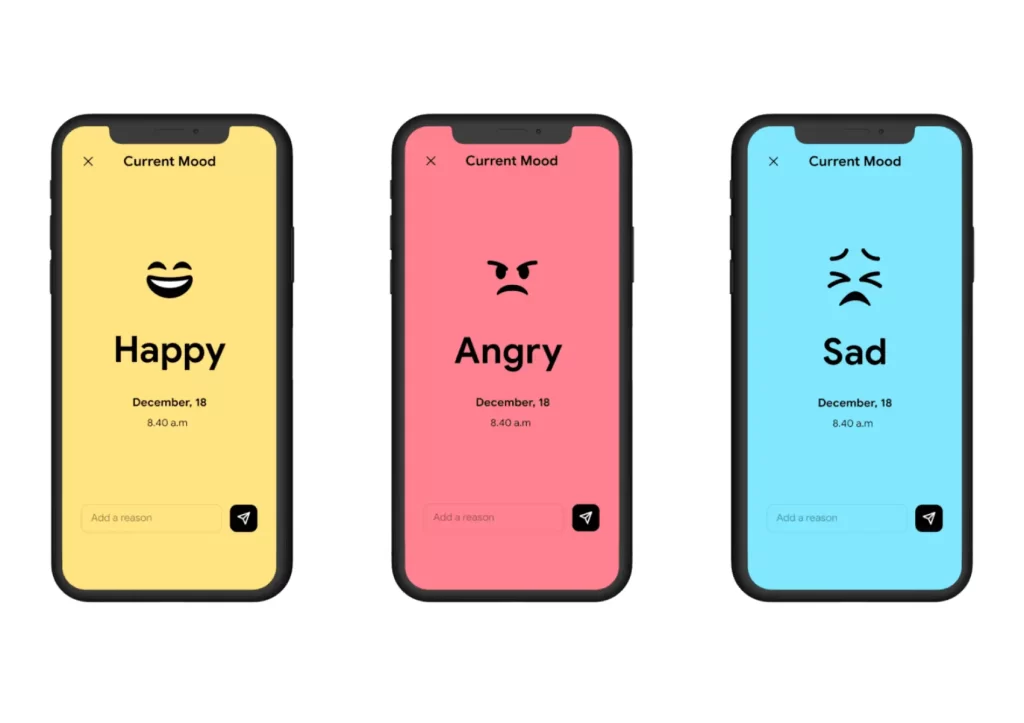
Journaling and reflection
Provide a space for users to write journal entries to express their thoughts, experiences, and reflections associated with their moods. This is one of the essential mood monitoring app features that encourages self-reflection, helps users identify patterns, and promotes emotional well-being by providing an outlet for self-expression.
Reminders and notifications
To help users stay consistent with mood tracking, the app should have a reminder feature that prompts them to log their mood regularly. Additionally, notifications can be used to provide motivational messages, reminders to engage in self-care activities, or alerts for potential triggers.
Goal setting
The app should enable users to set personal goals for mood management and mental well-being. Users can track their progress towards these goals, receive rewards or achievements for milestones achieved, and stay motivated through positive reinforcement.
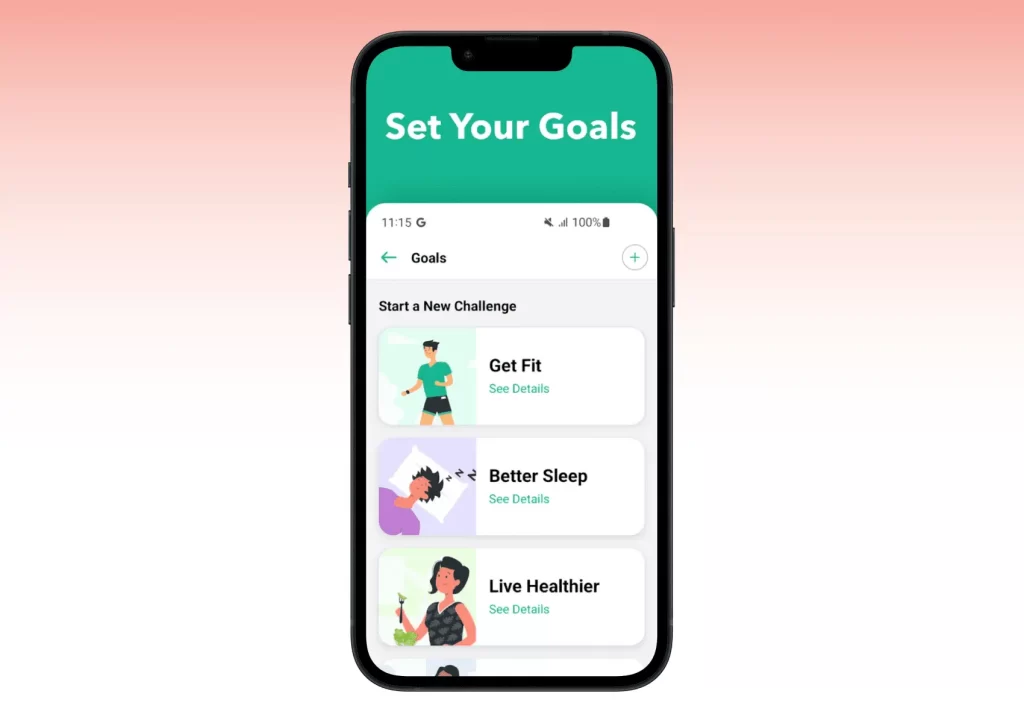
Daily insights
To provide deeper insights, the app should allow users to track their activities and behaviors alongside their moods. This can include monitoring sleep patterns, exercise routines, medication intake, or other relevant factors that may impact mood.
Trend analysis
The app should provide visual representations of users’ mood trends over time. This can be in the form of charts or graphs that show fluctuations in mood patterns, allowing users to track their progress and identify patterns or triggers for certain moods.
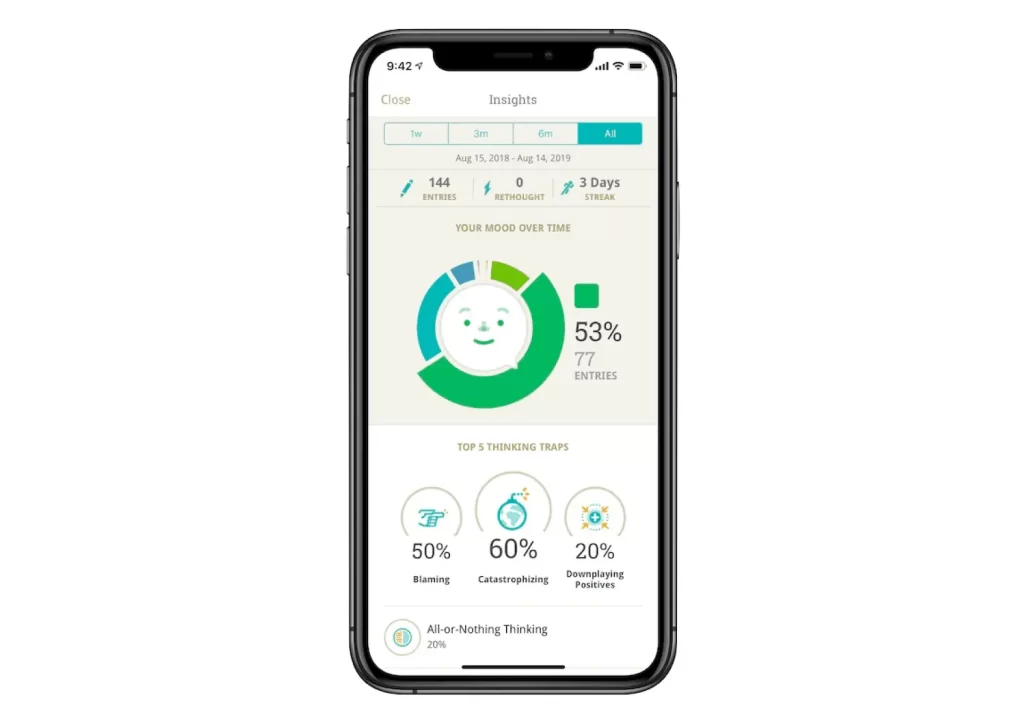
Community and support
Integration with a community or social platform within the app can enhance user engagement and provide a support network. Users can connect with others facing similar challenges, share experiences, and receive support and encouragement from the community.
Integration with wearable devices
To provide a seamless experience, the app can integrate with wearable devices that track biometric data like heart rate or sleep patterns. This integration provides a holistic view of users’ well-being and more accurate insights into the relationship between mood and physical health.
These features of mood tracking app collectively aim to empower users to manage their emotional well-being, gain insights into their moods, and foster a sense of self-awareness and personal growth.
Read also: How to Build an MVP for a Fitness Application
Best Practices and Expert Insights for Developing a Cutting-Edge Mood Tracking App
To stay ahead of the competition, mood tracker apps must offer non-standard and trendy features that provide an exceptional user experience. Below, our experts share some tips on how to create a mood tracker app that will deliver a cutting-edge and impactful experience.
Using AI and ML technology for intelligent mood analysis
By leveraging AI and ML technology, mood tracker apps can offer advanced mood analysis, personalized recommendations, and predictive capabilities. These smart algorithms can learn from user data, identify patterns, and adapt to individual needs, making the app more accurate and insightful.
Mood tracking gamification to keep users
Incorporating gamification into mood tracker applications adds an element of fun, engagement, and motivation to the process of tracking and managing moods. Introducing game-like features and mechanics encourages users to participate in their mood tracking journey actively. Gamification can include challenges, achievements, rewards, and progress tracking, which not only make the experience more enjoyable but also increase user retention and adherence.
Integration with wearable devices
Integration with wearable devices is a cutting-edge feature that enhances the functionality and accuracy of mood tracker applications. By connecting with smartwatches or fitness bands, mood trackers can gather real-time data on physiological indicators such as heart rate, sleep patterns, and physical activity levels. This valuable information provides deeper insights into the user’s overall well-being and helps paint a more comprehensive picture of their mood fluctuations.
Guided meditation and mindfulness exercises
Guided meditation and mindfulness exercises are powerful tools that promote mental well-being and emotional balance. Integrating these features into a mood tracker application offers users a holistic approach to managing their moods and improving their overall mental health. The app empowers users to cultivate mindfulness, reduce stress, and enhance their emotional resilience by providing guided meditation sessions, breathing exercises, and mindfulness practices.
Integration with therapist or coach support
Integration with therapist or coach support in a mood tracker application can significantly enhance the user’s mental health journey. Users can receive guidance, counseling, and personalized recommendations from certified therapists or coaches by providing access to professional support directly within the app. This integration ensures that users have a reliable and convenient resource to turn to when they need additional help, advice, or a listening ear. Whether through text-based messaging, audio or video calls, or scheduled sessions, the app’s integration with therapists or coaches offers a personalized and comprehensive approach to mood tracking and mental well-being.
These non-standard, trendy features enhance the user experience, offer unique functionalities, and elevate the effectiveness of a mood tracker application, making it a powerful tool for emotional well-being and self-improvement.
How Much Does It Really Cost to Develop a High-Quality Mood Tracking App?
Developing a mood tracking app involves several basic steps, each contributing to the project’s overall cost. Let’s break down these steps and provide an approximate estimate of the associated costs:
Research and planning
This initial phase involves market research, competitor analysis, and defining the app’s features and target audience. The cost for this step can range from $2,000 to $5,000, depending on the complexity of the app and the extent of research required.
Read also: How to Move From Idea to Prototype [A Step-By-Step Guide]
UI/UX design
Creating an intuitive and visually appealing UI/UX design is crucial for a mood tracking app. The design process, including wireframing and prototyping, may cost between $5,000 and $9,000, depending on the complexity and number of screens.
Development
This phase involves coding and implementing the features of the app. The cost of mood tracking app development can vary significantly based on factors such as the platform (iOS, Android, or both), the complexity of features, and the development time required. On average, mood tracking app development costs can range from $15,000 to $25,000 or more.
Backend development
If your mood tracking app requires a server and database infrastructure to store user data, additional costs for backend development may apply. This can range from $15,000 to $30,000, depending on the complexity of the backend system.
Testing and quality assurance
Thorough testing and quality assurance are essential to ensure a stable and bug-free app. The cost for this step may vary based on the size of the app and the testing requirements but typically falls between $2,000 and $8,000.
Deployment and maintenance
Getting the app live on the app stores and providing ongoing maintenance and updates are important considerations. App store deployment fees can vary, typically around $100 to $300 per year, and ongoing maintenance costs can range from $2,000 to $5,000 per month, depending on the app’s complexity and support requirements.
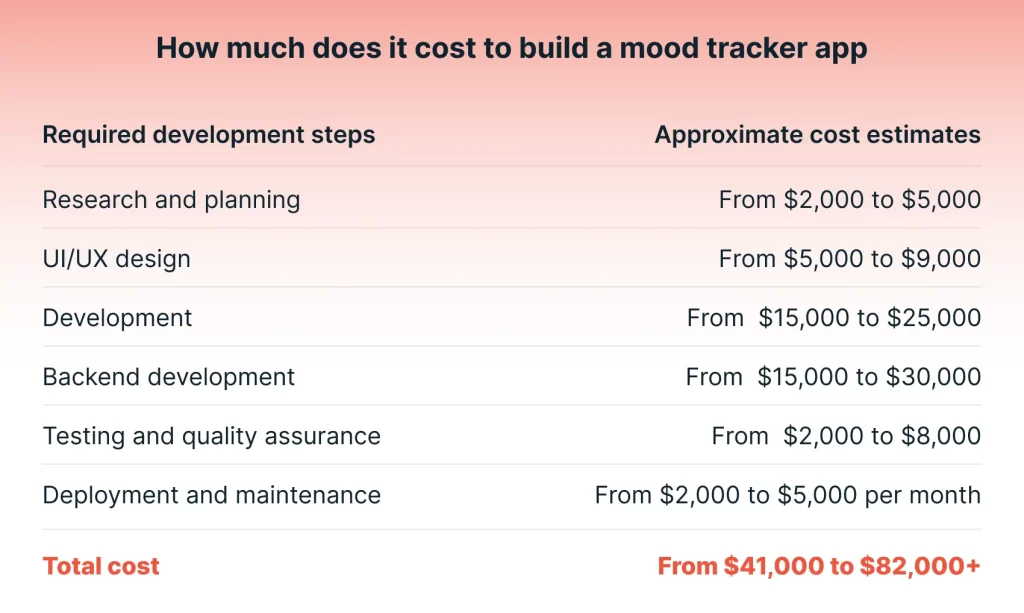
Note: It’s important to note that these cost estimates are rough averages and can vary depending on various factors, such as the app’s complexity, desired features, development team rates, and geographical location.
As an experienced app development company, we can provide a more accurate cost estimate tailored to your specific project requirements. By collaborating with our professionals who have expertise in app development, you get a transparent and detailed cost breakdown that aligns with your budget and goals.
Strategies for Monetizing Your Mood Tracking App
A mood-tracking app can generate revenue through various monetization strategies that align with its unique features and target audience. Here are some standard revenue models and methods to consider:
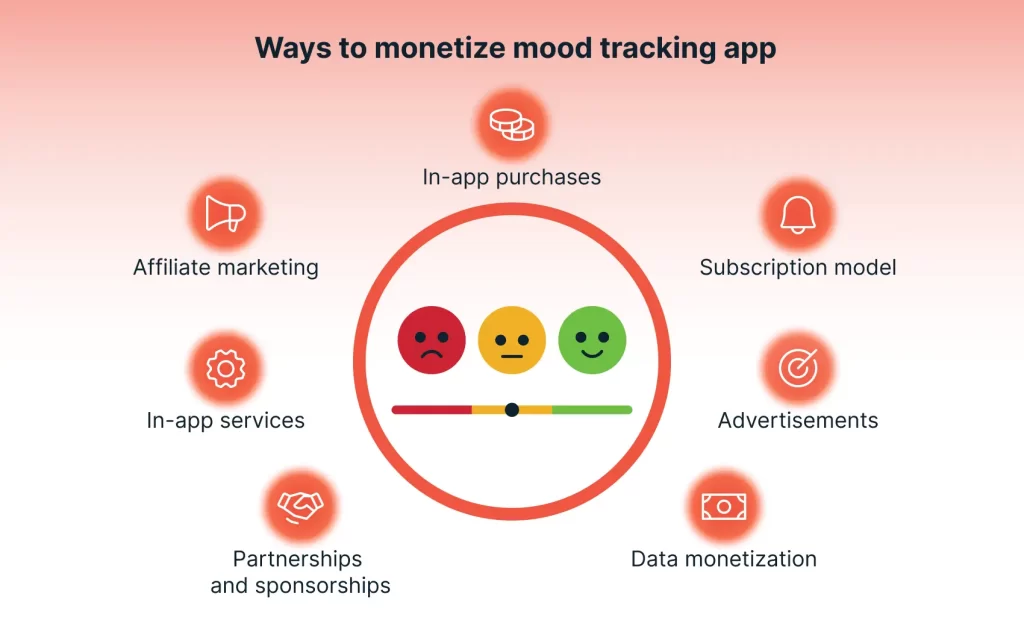
In-app purchases
Offer premium features or content that users can unlock through in-app purchases, such as advanced mood analysis, personalized recommendations, or exclusive meditation sessions.
Subscription model
Implement a subscription-based revenue model, where users pay a recurring fee to access premium features, additional tracking options, or personalized insights.
Advertisements
Display targeted advertisements within the app, either as banner ads or in-between sessions, to generate revenue from advertising partners.
Data monetization
Aggregating and anonymizing user data can be valuable for market research and analytics. You can collaborate with research institutions or sell aggregated data to gain insights and generate revenue.
Partnerships and sponsorships
Collaborate with relevant brands, mental health professionals, or wellness companies to offer sponsored content, partnerships, or co-branded initiatives that align with the app’s purpose and generate revenue through sponsorship deals.
In-app services
Offer additional services within the app, such as guided therapy sessions, access to certified psychologists or therapists, or premium content from mental health experts, which users can purchase for a fee.
Affiliate marketing
Partner with affiliate programs or relevant platforms to recommend products or services that align with mental well-being, earning a commission for every referral or successful transaction made through the app.
The most suitable revenue model will depend on the app’s target audience, unique value proposition, competition, and market demand. A comprehensive market analysis and understanding of user preferences can help determine the optimal revenue strategy for your mood-tracking app.
Alternative-spaces Experience
Whether you need an app for mood tracking, monitoring sports performance, or want a custom mobile healthcare application, Alternative-spaces is the reliable technology partner you can count on for success. With over 22 years of experience, we have a proven track record of helping businesses in various industries to develop, scale, enhance, and support unique technology solutions.
Our company can build a custom app for you from scratch, improve your existing product, or provide the required specialists or an entire dedicated team for your ongoing project.
The Alternative-spaces team has extensive experience creating user-friendly and intuitive web and mobile health applications. For example, recently, we’ve developed InnerVR, a meditation and relaxation VR game for Oculus Quest 2 designed to help users be more mindful.
The development of InnerVR Beta resulted in a visually stunning and optimized VR meditation app, showcasing innovative solutions and capturing the essence of relaxation and engagement.

We also have experience building mobile apps integrated with wearable devices. Phlex is a simple tool that enables swimmers to connect their wearable devices with a mobile app and collect motion data for accurately tracking their swimming. Using unique devices with motion data analysis, Phlex analyzes the user’s motions during training and, based on that, provides precise data about users’ swimming technique and performance.
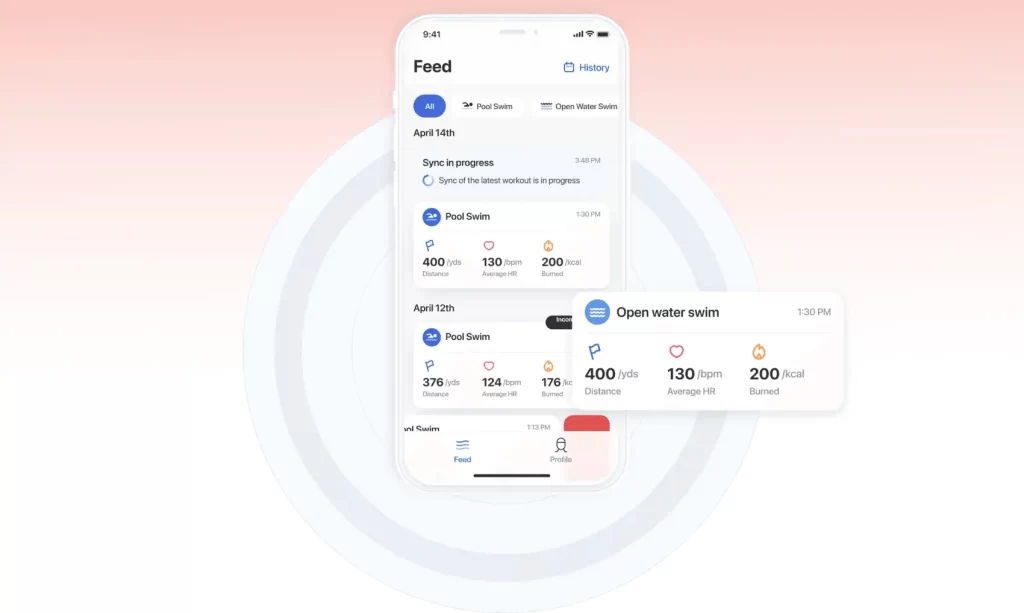
Our team of app development experts is equipped to create custom solutions that align with your specific objectives and requirements!
Summing up
In conclusion, building a mood tracker for digital health is a valuable endeavor that can significantly impact people’s well-being. By incorporating the right features, such as advanced data analytics, intuitive user interfaces, and personalized recommendations, you can create a powerful tool that helps individuals track, understand, and manage their emotions effectively.
If you’re interested in building a mood tracker app or have any questions about digital health and app development, don’t hesitate to contact our team. We are here to support you in transforming your vision into a successful and impactful application.
Contact us today to discuss your project in more detail and explore the possibilities of creating a mood tracker app that makes a difference in people’s lives.

FAQ
- How can AI and ML technology enhance a mood tracker app?
AI and ML technology can significantly enhance a mood tracker app by providing users with valuable insights and personalized experiences. Here’s how:
- Personalized mood analysis. AI algorithms can analyze data from users’ mood logs, journal entries, and other inputs to identify patterns and trends in their emotional states. This analysis helps users gain deeper insights into their moods and emotions.
- Mood prediction. ML models can predict a user’s mood based on various factors like time of day, weather, and recent activities. This predictive feature can help users be more aware of their emotional fluctuations and triggers.
- Smart recommendations. AI-powered mood tracker apps can offer personalized recommendations for activities, exercises, or mindfulness practices based on a user’s mood patterns. This feature can help users manage their emotions more effectively.
- Sentiment analysis. AI can analyze text-based entries to understand the emotional tone and sentiment behind the user’s journaling. This enables the app to provide more relevant insights and support.
- Real-time feedback. ML models can provide real-time feedback and suggestions based on the user’s mood or emotional state. This instant support can be valuable during stressful or challenging moments.
- Integration with wearables. AI and ML can be used to integrate mood tracker apps with wearable devices, like fitness trackers or smartwatches. This allows for continuous monitoring and additional data points for a more comprehensive view of the user’s emotional well-being.
- Continuous improvement. AI-driven mood tracker apps can continuously learn from user interactions, feedback, and data, improving the app’s accuracy and relevance.
Contact our team to explore the possibilities of integrating AI and ML into your mood tracker app for a more impactful and user-centric experience.
- Is data privacy a concern in mood tracker apps?
Yes, data privacy is crucial in any health-related app, including mood trackers. At Alternative-spaces, we understand the paramount importance of safeguarding user data. When developing mood tracker apps, we adhere to strict data protection regulations and implement robust security measures. We ensure that all user data is encrypted and stored securely, and access is granted only to authorized personnel.
- Can a mood tracker app integrate with wearable devices?
Yes, integrating a mood tracker app with wearable devices, such as fitness trackers or smartwatches, can provide additional data points for a more holistic view of the user’s well-being. This integration can offer valuable insights into how physical activity and mood correlate.
- How can Alternative-spaces help in building a mood tracker app?
At Alternative-spaces, we have extensive experience in app development, including mood tracker apps for digital health. Our skilled developers, designers, and AI specialists can provide comprehensive solutions tailored to your project requirements. We offer consulting, development, and ongoing support to bring your vision to life successfully.
- How much does it cost to build a mood tracker app?
The cost of building a mood tracker app varies based on the complexity of features, design, and development time. We recommend contacting our team for a detailed consultation and cost analysis to get a more accurate estimate for your project.
- Is it possible to monetize a mood tracker app?
Yes, mood tracker apps have various monetization strategies, such as in-app purchases, subscriptions, or offering premium features. The most suitable approach depends on your target audience, app features, and business goals.
- Can Alternative-spaces provide ongoing support and updates for the app?
Absolutely! At Alternative-spaces, we offer ongoing support and maintenance services to ensure your mood tracker app remains up-to-date and runs smoothly. We are committed to delivering top-notch customer service and optimizing your app for the best user experience.
- How do I get started in building a mood tracker app with Alternative-spaces?
Getting started is easy! Contact our team to discuss your project idea, goals, and requirements. Our experts will guide you through the development process and help you develop an emotion tracker app that aligns with your vision and contributes positively to digital health.
Content created by our partner, Onix-systems.
Source: https://onix-systems.com/blog/how-to-develop-a-mood-tracker-app Home
Home